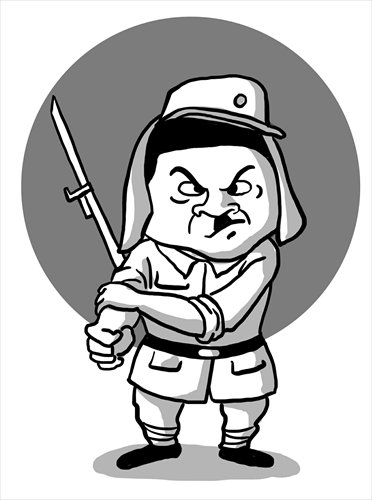Tokyo and Beijing need to draw back from reactive circle

Illustration: Liu Rui/GT
China's rebuff to Japanese Prime Minister Shinzo Abe's call for a bilateral meeting during the G20 meetings early this month and a recent opinion poll, indicating that more than 90 percent of both Chinese and Japanese public view each other unfavorably, highlight the security dilemmas in Northeast Asia.
Tensions between China and Japan have spurred nationalism in both countries and raised anew questions about each nation's intentions in regard to the other, as reflected in Chinese and Japanese public opinion.
France and Germany came to terms with each other after WWII, and only then was a stable, integrated Europe possible. Achieving a new comfort level for both sides in the Sino-Japanese relationship is critical for East Asia's future.
Yet Japan's difficulty in accurately remembering the past and China's difficulty in forgetting it result in a volatile relationship.
Distorting the past complicates Tokyo's efforts to become a more normal nation. The numerous apologies and billions of dollars in aid to China since the normalization of relations in 1972 get overshadowed by emotional nationalist reactions to statements re-imagining history.
Both Tokyo and Beijing need to take a deep breath and begin to think anew how to move beyond this dangerous stalemate.
China often expresses concern when Japan enhances its defense capabilities, as with the recent unveiling of a helicopter carrier. Moreover, the US-Japan alliance is often cited by Chinese analysts as part of a strategy to contain China. Yet for the past 35 years, as China transformed its economy, the US-Japan alliance has underpinned stability in East Asia facilitating China's peaceful rise.
If China has concerns about Japan's defense spending, which is about half that of China, imagine what the regional security picture would look like if Japan was strategically independent.
While Japan has very capable air and naval forces and increasingly adept missile defenses, it does not yet possess an offensive strike capacity. Even its new helicopter carrier is more suited to humanitarian or natural disasters than offensive missions. Would China or Japan be more secure if Tokyo developed long-range missiles and nuclear weapons?
Viewed against the alternatives, the US-Japan alliance is better seen as a stabilizing factor in the US-Japan-China triangle.
As the world's third largest economy and a global technology leader, Japan has the industrial and technological bases to develop offensive capabilities if it chose to do so.
Tokyo's efforts are centered on defensive capabilities, constrained in part by a pacifist political culture that developed after the horrors of WWII, and by its constitution.
Japan seeks to continue the trend of becoming a more equal partner of the US. Japan's post-WWII constitution prohibits collective self-defense, and opinion polls suggest the Japanese public is divided on whether to revise its constitution. But at present, if North Korea fired a missile at the US, Japan would be unable to use its capabilities to help.
Abe's overwhelming priority is fixing the economy. But Japan's desire to be a more normal nation will not go away. Even if Abe at some point in the future succeeds in revising Japan's constitution to permit collective defense, his highest strategic priority is strengthening the US-Japan alliance.
As Tokyo formulates its next five-year defense planning guidance, even if Sino-Japanese relations improve, it will still need to consider how to protect itself from threats from China's ally North Korea. Pyongyang continues to develop long-range missiles and has on more than one occasion fired test missiles over Japanese territory, most recently in December 2012.
China rightly argues Japan should better reconcile itself with the horrors inflicted in the 1930s, as Germany has done. But China also needs to move beyond the easy temptation of anti-Japanese nationalism.
Both Tokyo and Beijing would benefit from avoiding a cycle of action-reaction in their respective defense planning. The challenge is how to define a new type of major power relationship between Tokyo and Beijing.
The author is a senior fellow of the Brent Scowcroft Center for International Security at the Atlantic Council. opinion@globaltimes.com.cn